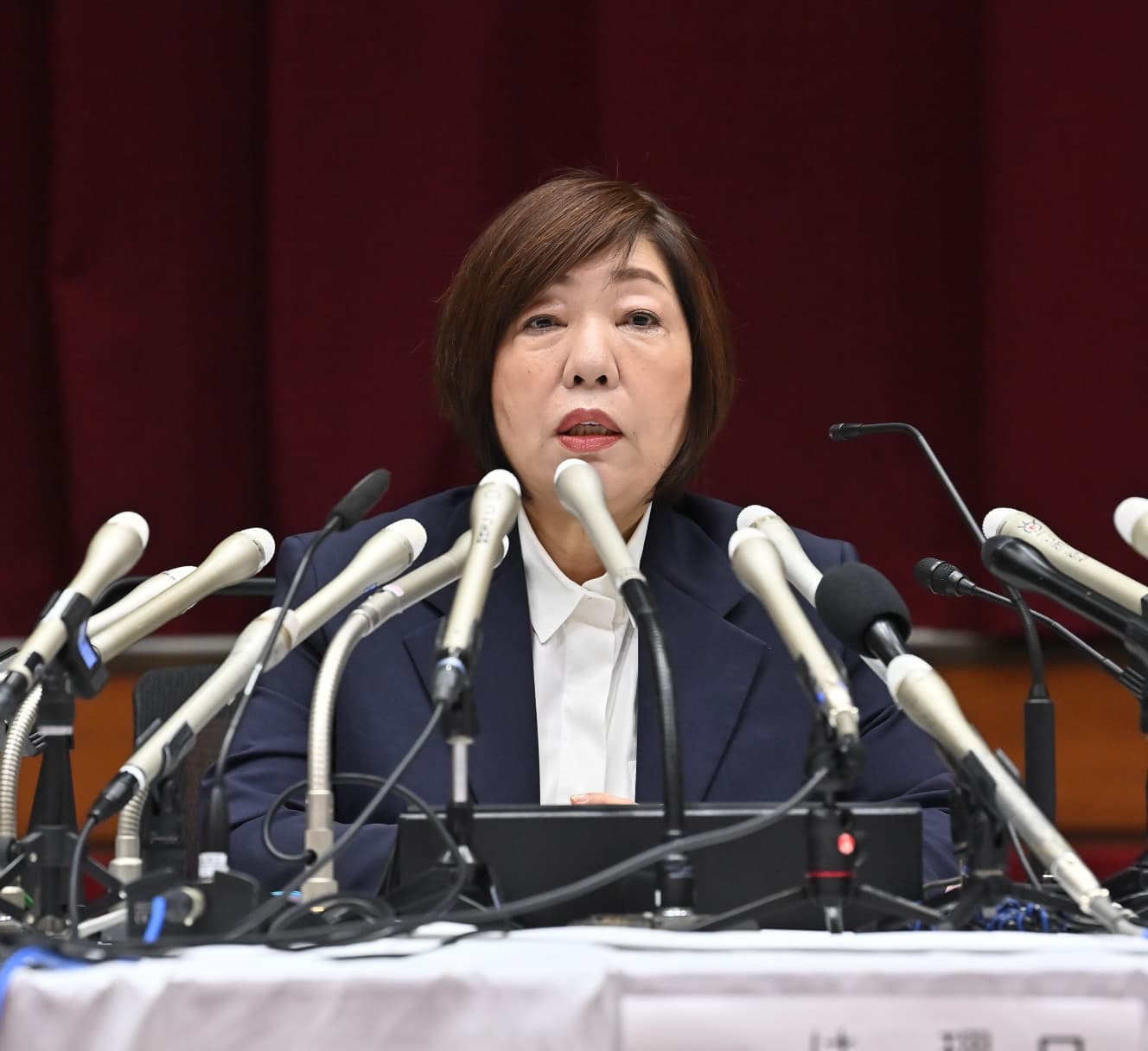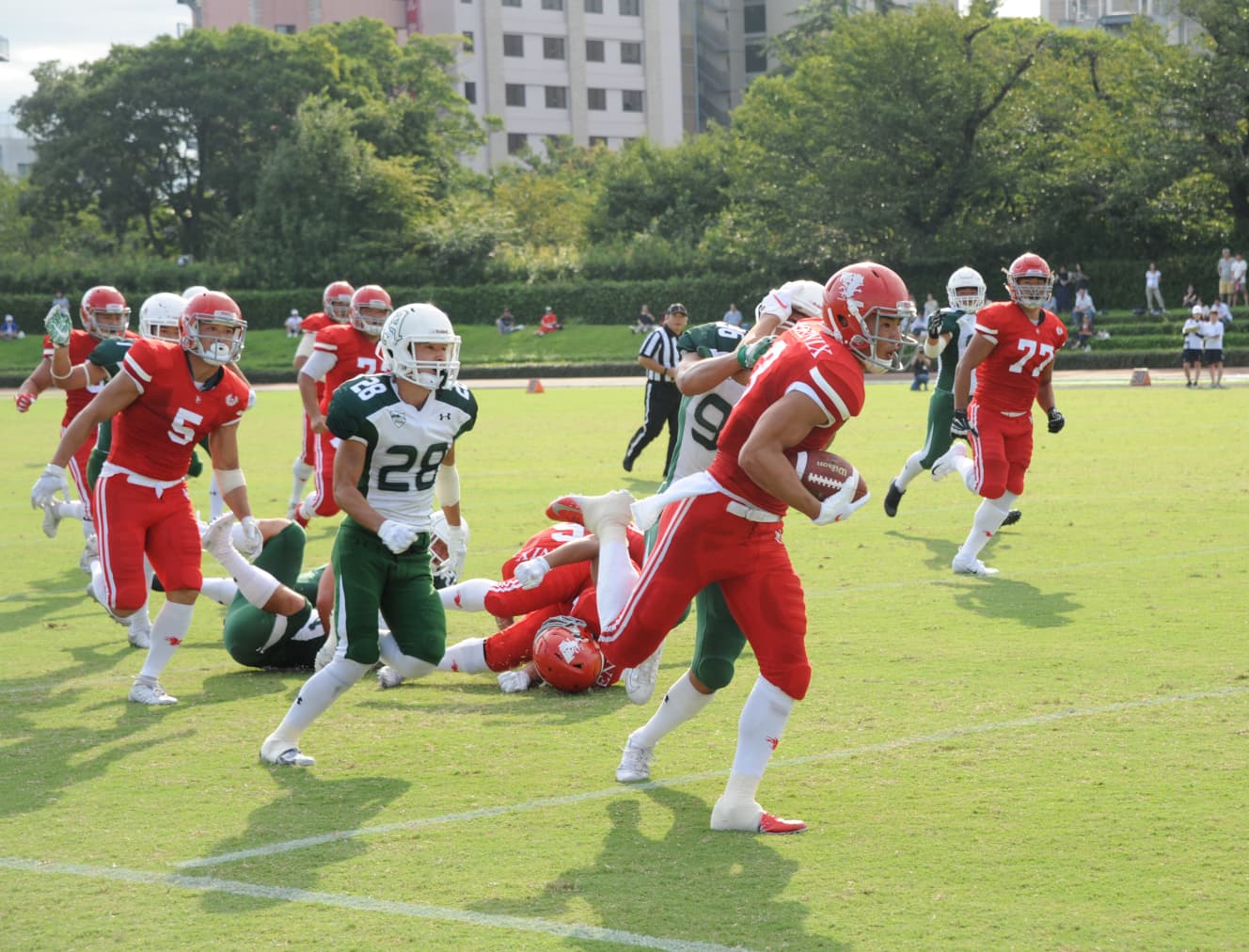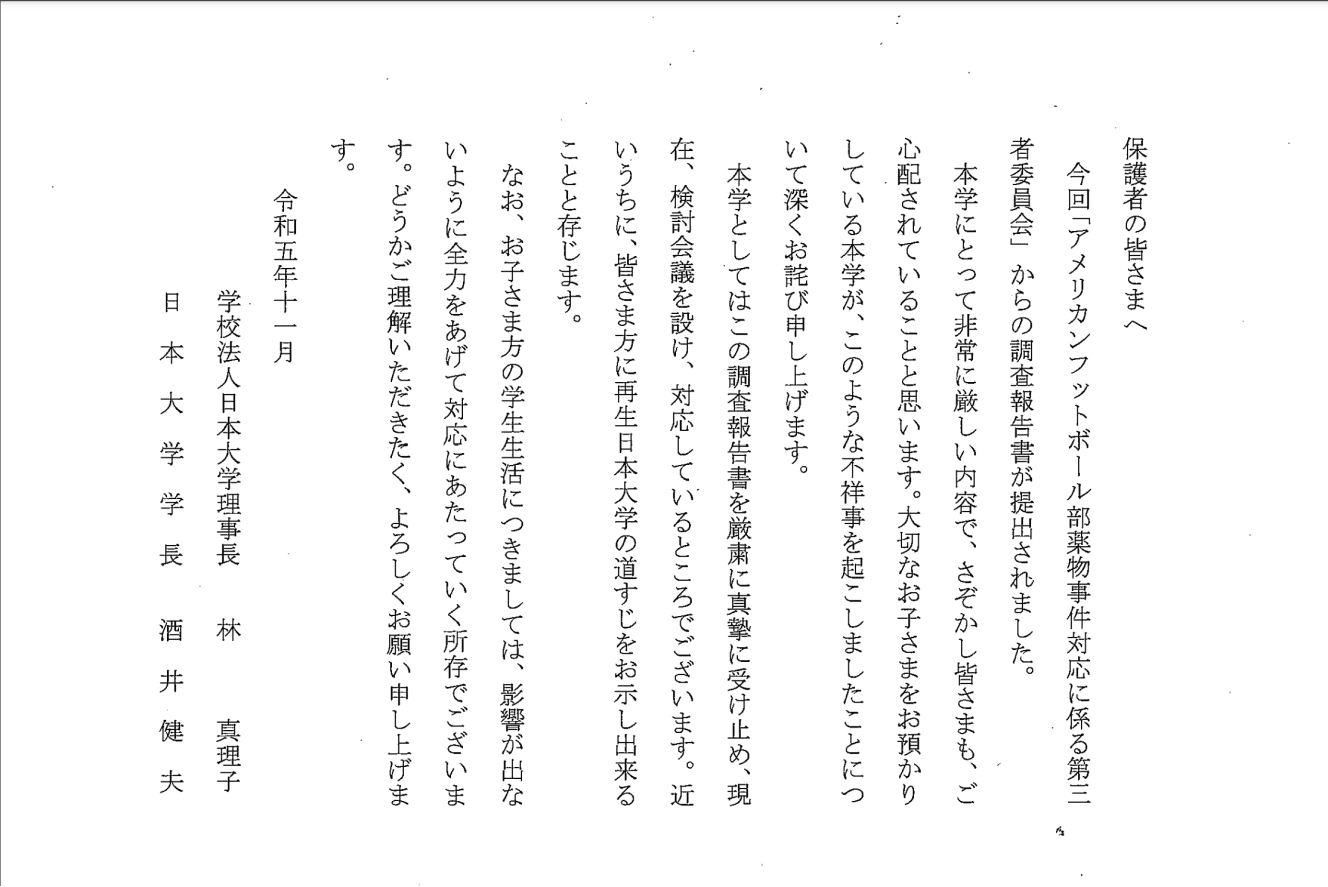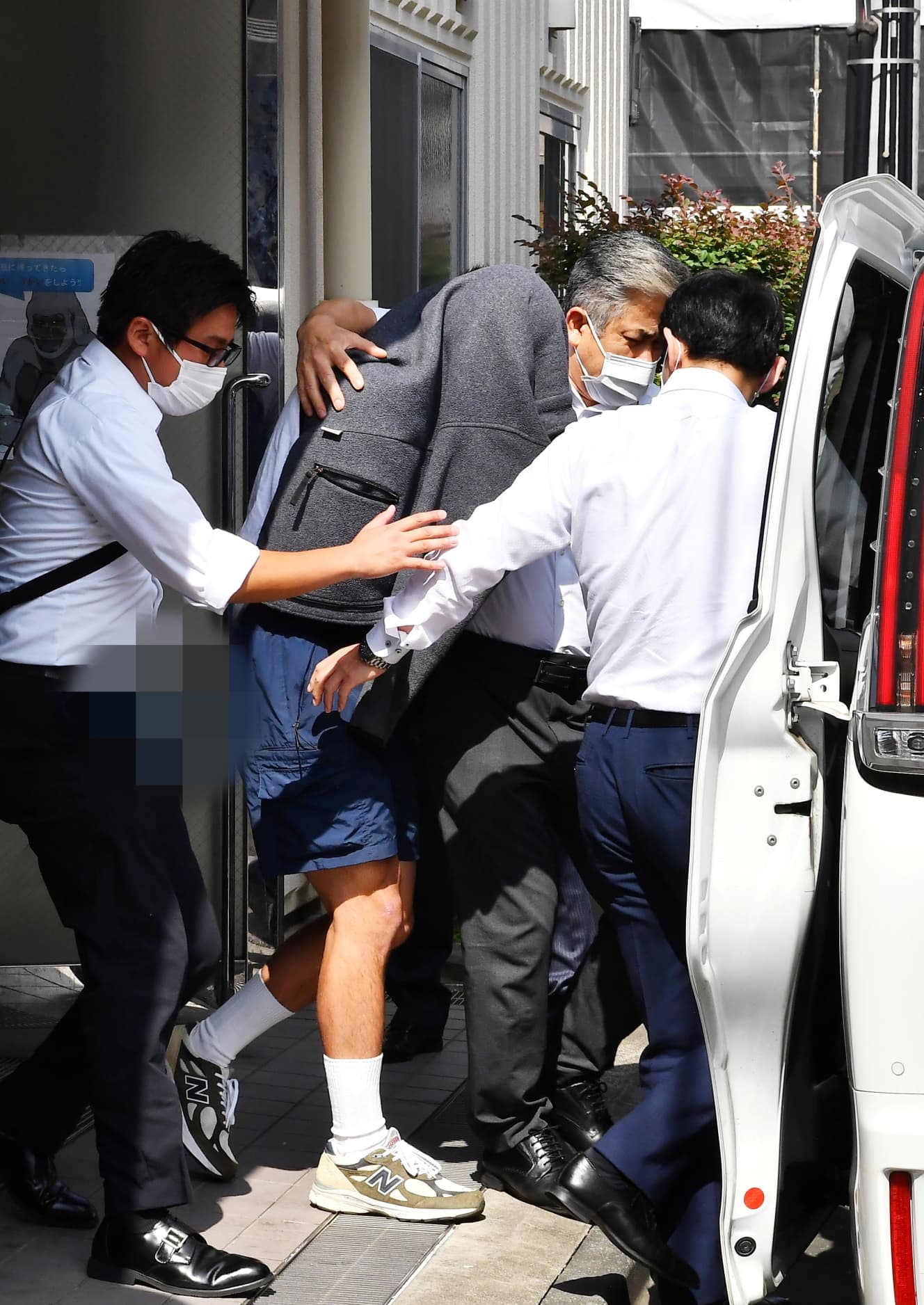The abolition of the Nihon University football team is “not an easy decision to make.” Rival schools have collected more than 10,000 signatures to prevent the abolition of the team, a sentiment that is too deep.

Strong Presence
Chancellor Mariko Hayashi, 69, gave only a half-hearted response at a press conference on December 4, saying, “The board of trustees is still discussing the matter, and we will decide as soon as possible” on the abolition of the American football team of Nihon University in response to the illegal drug case.
At the end of November, it was reported in the media as if the decision to abolish the club was a done deal, but it is only “one policy” and no conclusion has been reached as to whether the club should be abolished or continue to exist. In fact, it is fair to say that the club has been forced into a predicament in which it is unable to come to a decision.
Toshiki Tsuda, a sportswriter who has covered the college football world for many years and is the author of “Unwavering Sports Reporting” (Kotobukisha), which delves into the truth behind the malicious tackling incident at Nihon University in May 2006, makes this clear.
In an article in FRIDAY Digital that was uploaded on November 12, he commented, “Some on-campus officials are advocating the abolition of the club, but their voices are dissipating. I still stand by that outlook, and speaking on behalf of Chancellor Hayashi, who appears to be indecisive, the football team must be allowed to continue. The team is respected by schools in both the Kanto and Kansai regions, and has an immortal history, so its presence is tremendous.
The Nihon University football team was founded in 1940, and the late Mikio Shinotake, who took over as coach in 1959, developed a “shotgun formation” in which the team used wide-angle passes to taunt opposing defenders and led the team on a path to glory.
The team played many famous games against Kwansei Gakuin University, the leader of the Kansai region, in the Koshien Bowl, which decides the top student team in Japan, as “Nichi-Dai in red” and “Kwansei Gakuin University in blue. After a period of stagnation since the 1990s, the two teams played each other again for the first time in 27 years in 2005 and reached the top of the standings for the 21st time.
Not only Kwansei Gakuin, but also officials from Ritsumeikan University and Kyoto University said, “We have been bounced back and forth again and again against a thick wall. We thought and thought about what we had to do to shut out the shotgun, and everything came down to defeating Nihon University,” they all said in unison.
When I see those red uniforms, my blood still burns even after graduation. When I look at other schools in the Kanto region, I still don’t feel the same fighting spirit. It is immeasurable how much we have grown by practicing with the goal of beating Nihon University,” said a former member of the university’s football team.
Mr. Tsuda also relates a surprising episode.
I have not seen the actual writing, but it is said that there was a player who wrote a suicide note to his parents before leaving home for a game. This is an expression of their determination to win at all costs. Students push themselves physically and mentally to get on the field.
He is unwavering in his admiration for Nihon University, saying that he was able to grow because of the difficult opponents he faced. With sentiments that can only be understood by those who have experienced contact sports, where bodies collide with bodies, Kwansei Gakuin alumni have gathered signatures on the Internet demanding the abolition of the club, and the number of signatures is said to have far exceeded 10,000. Of course, the illegal drug incident is unforgivable, but the petition was launched out of a sincere wish to avoid the abolition of the club.

What should be done to ensure the survival of the Nihon University football team? Mr. Tsuda suggests a break from the inward-looking attitude and exclusionism.
In addition to preventing a recurrence of the incident, we must also put an end to the problems other than the incident. In a word, we must cut off the interest groups that crowd around the football club. The management of training camps and practice facilities, equipment, uniforms, etc., costs a lot of money, and there are alumni who have been sucking the sweet juice from the cozy business. During the malicious tackling incident, we tried to expel them, but in the end we could not. This time, the university must take a strong stance of completely draining out all the pus.
Next, what exactly will be done to keep the club going? Some media outlets have suggested activities as a club or circle, or transferring to another university, but these are all too unrealistic.
The power and speed of the top and the bottom teams in the league are very different. In football, you can get hit on the head or hurt your cervical vertebrae, which can lead to serious injuries. If it is at the level of a club, it is no longer a competitive game.
If this is the case, the only way for the team to climb up from the bottom is to apologize to the Kanto Student American Football Federation by presenting the truth of the series of incidents, the punishment of those responsible, and measures to prevent recurrence, accept demotion to a lower league, and climb up from the bottom.
The leadership must also have the humility and magnanimity to invite coaches and managers from outside the organization, rather than being made up of alumni.
Some even say that the hotbed of the drug incident was the disorderly public morals in the training camp, and that it was due to a lack of strictness on the part of former coach Hashizume. However, this is an outrageous shift of responsibility and slander. There is no way to revitalize the company unless we take a scalpel to its constitution that protects its own people and hates outsiders,” said Tsuda.
Is it enough to keep the West high and the East low?
This year’s Koshien Bowl will be played between Kwansei Gakuin University and Hosei University on December 17. On the same day that Nihon University’s Chancellor Hayashi held a press conference, the Japan Student Football Association announced a change in the format of the Koshien Bowl, which will be played next year, with three schools from each of the Kanto and Kansai leagues participating. The 12 schools, including those from Hokkaido and Tohoku, will compete for the championship, and six schools from the Kanto and Kansai leagues will participate from the quarterfinals onward.
In the last 20 years, the Kanto team has won three and lost 17. Since Nihon University in 2005, they have not been number one in Japan, and depending on the outcome of the tournament, there is even a possibility of a final between the two Kansai schools.
The student football world is facing a major turning point. For the revival of the Kanto team, the footprints of the Nichidai Phoenix must not be erased.



PHOTO.: Shinji Hasuo (1st, 3rd, 4th) Jiji Press (2nd)